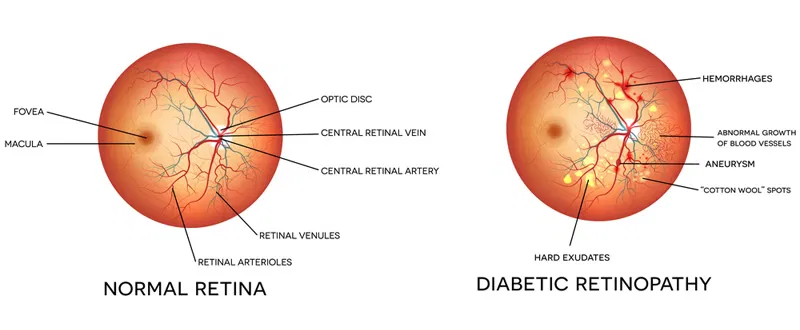NDP EyeCare | Dr. N D Patil | Dr. Gaurav Patil | Cataract | Glaucoma | Oculoplasty | LASIK
Our Latest Equipment is Best to keep your Vision perfect like Eagle!

Why Early Care Matters
In Nagpur, many patients confront concerns over diabetic eye health. However, plenty still underestimate the danger. Since symptoms often appear only in advanced stages, routine eye checks assume vital importance. Early detection allows treatment options that restore vision and prevent complications like macular edema, vitreous hemorrhage, or retinal detachment.
Services Provided by Dr. Patil for Diabetic Retinopathy
Dr. Patil provides comprehensive care for diabetic retina issues. He begins with screening and diagnosis, then offers treatments adapted to the stage of disease. Key services include:
Screening and Diagnostic Examinations
He uses state-of-the-art diagnostic equipment: dilated fundus examination, retinal imaging (fundus photography), optical coherence tomography (OCT), fluorescein angiography. Because precise diagnosis informs proper treatment, Dr. Patil ensures detailed evaluation from the outset.Laser Therapy
When early or moderate non-proliferative diabetic retinopathy appears, laser photocoagulation therapy often proves effective. Dr. Patil performs focal and pan-retinal laser treatments to seal leaking vessels and reduce risk of bleeding. He applies them based on retinopathy severity, always balancing benefits and potential side effects.Anti-VEGF Injections / Pharmacotherapy
He offers intravitreal injections of medications that block vascular endothelial growth factor (VEGF). Because VEGF promotes abnormal blood vessel growth and leakage, these injections help when macular edema or proliferative changes occur. He monitors patients closely and applies injections with sterility and precision.Vitreo-Retinal Surgery
In advanced cases—when vitreous hemorrhages or retinal detachments threaten vision—Dr. Patil performs microsurgical procedures. His experience enables him to manage complex surgical interventions safely, restore retinal structure, and improve visual function.Post-Treatment Follow-up and Monitoring
Even after successful treatment, he sets up regular follow-ups. He monitors for recurrence of leakage or bleeding, adjusts therapy if needed, and educates patients to maintain strict blood sugar control, blood pressure, and lipid levels. He underscores that medical management outside the eye significantly impacts long-term outcomes.
Why Choose Dr. N. D. Patil for Treatment in Nagpur
Several factors make Dr. Patil a preferred diabetic retina specialist in Nagpur. First, his long years of practice have built confidence among patients. He has performed thousands of surgeries, served thousands of patients, and maintained high satisfaction. Second, he combines modern technology with compassionate care. He makes every effort to explain diagnosis and treatment options clearly. Third, he ensures patients receive affordable, accessible eye services without compromising quality.At Dr. N.D. Patil’s clinic in Nagpur, eye tests are carried out using the latest machines such as autorefractors, slit lamps, tonometers, and fundus cameras, ensuring accuracy and comfort for patients.
Common Signs & Symptoms of Diabetic Retina Issues
Diabetes may harm the retina silently at first. Patients should watch for signals including:
Blurred or fluctuating vision
Floaters or dark spots in vision
Difficulty reading or seeing details
Loss of peripheral (side) vision
Colors appearing faded or dull
Sudden vision loss (in emergencies)
When any of these symptoms emerge, patients should consult retina specialists immediately. Delay may allow irreversible damage.
Treatment Path: What Patients Can Expect
Patients who consult Dr. Patil undergo a structured journey that involves the following phases:
Initial Consultation & Screening
He takes patient’s history, checks HbA1c (blood sugar average), inspects retina via dilated pupil, obtains imaging.Diagnosis & Staging
Based on findings, he classifies retinopathy as non-proliferative (mild, moderate, severe) or proliferative. He measures macular edema if present.Treatment Planning
He recommends best treatment—laser, injections, surgery—or combination. He discusses risks, benefits, expected outcomes, aftercare.Intervention
He performs chosen treatment in sterile environment. He ensures patient safety and comfort during procedures.Maintenance & Lifestyle Management
He schedules follow-ups to monitor progress. Also, he guides on sugar control, diet, blood pressure, exercise. He educates on smoking cessation if relevant.
Patient Education & Lifestyle: Critical Role Beyond Treatment
No treatment alone suffices without proper patient cooperation. Dr. Patil emphasizes that:
Controlling blood sugar levels remains first line of defense against diabetic retinopathy. Poor control accelerates retinal damage.
Managing blood pressure and cholesterol helps reduce risk.
Maintaining a healthy diet – rich in green leafy vegetables, omega-3 fatty acids, low in processed sugars – supports retinal health.
Regular physical activity improves circulation and metabolic control.
Avoiding smoking and excessive alcohol intake reduces oxidative stress in the retina.
Scheduling eye exams at least once a year or more often if retinopathy already exists.
He ensures patients understand these non-surgical strategies. He teaches them how diet, lifestyle, and systemic disease control complement ocular treatments dramatica
Book an Appointment Today
If you are searching for the best glaucoma specialist in Nagpur, look no further than Dr. N.D. Patil at the Centre of Advanced Eye Care. Early intervention is the key to preserving your sight. So, don’t wait until it’s too late—schedule your consultation today and take the first step toward protecting your vision.

